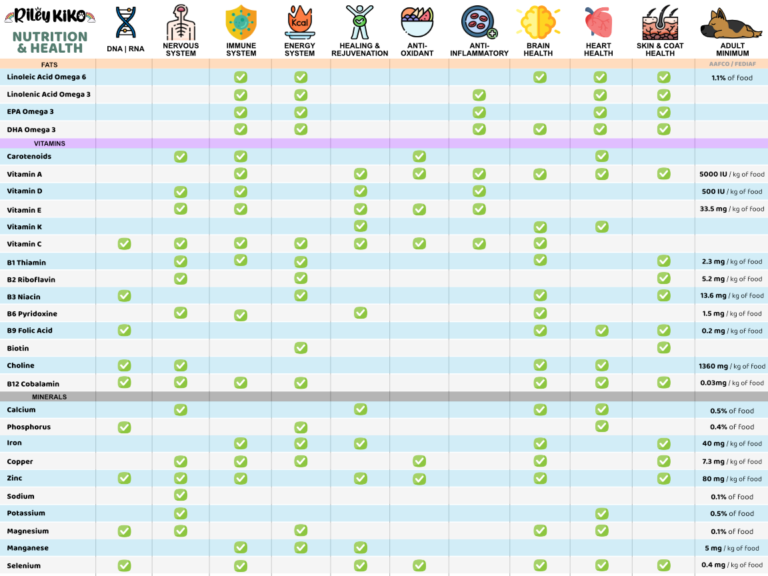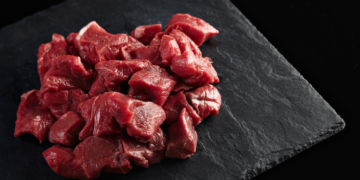IN SHORT
- focus on adding enough vitamins A D E to homemade diets as these are usually at insufficient levels
- excessive feeding of marine fish and fish liver oils can pose a risk of too much vitamin D
- fat is needed for the proper digestion and absorption of vitamins A E D K
- B vitamins are widely found in animal and plant foods, except for B12, so deficiency of B vitamins is uncommon
- some B vitamins are heat sensitive so shorter cooking times ensure more intact vitamin Bs
TIP
Food diversity & variety help minimise the possibility of deficiencies.
VITAMINS FURTHER EXPLAINED
- vitamins are organic nutrients needed by the body to function normally
- fat soluble vitamins A E D K can be stored in the body
- this makes the body more resistant to vitamin A E D K deficiency
- but this makes it more likely for excesses of vitamin A E D K to be toxic
- fat is needed for the digestion and absorption of fat soluble vitamins A E D K
- B complex vitamins are the only water soluble vitamins dogs require
- dogs can synthesize vitamin C in their bodies
- water soluble vitamins are depleted at a faster rate because of limited storage
- thus B complex vitamins are less likely to cause toxicity because of this limited storage
- moderate excesses of vitamins (up to 10 times the requirement for most vitamins) do not compromise the animal*
FAT SOLUBLE VITAMINS
- supports vision, growth and immune function*
- pre-formed Vitamin A is not found in plants
- dogs convert beta-carotene in plants to vitamin A in their small intestines (not cats)
- a healthy liver can store years supply of vitamin A
- toxicity from food is not common
- toxicity can happen from over supplementation (taking 50 to 150 times daily requirements for a few months)
- diets lacking in fat can result in insufficient absorption of vitamin A
- AAFCO recommends 5000 IU per kg of food
- should not exceed 250,000 IU per kg of food
TIP
- adding livers or carrots are our favourite way of making sure our dogs get enough vitamin A
- calcium, phosphorus and vitamin D interact in the maintenance of normal mineral status and skeletal integrity+
- as it rarely occurs in plants ~ deficiencies have been noted in dogs consuming vegetarian diets
- marine fish and fish liver oils are the richest source of vitamin D
- most other foods contain little vitamin D so supplementation is important
- toxicity is not common but
- excessive feeding of marine fish and fish oils can pose a risk of toxicity
- AAFCO recommends 500 IU per kg of food
- should not exceed 3,000 IU per kg of food
TIP
- occasionally adding a 400IU vitamin D and 600 mg calcium supplement is how we give our dogs a boost of vitamin D
- prevents free-radical or oxidative damage
- vitamin E is synthesized only by plants
- found in small amounts in almost all tissue
- vitamin E protects vitamin A from oxidative damage
- omega-3 and omega-6 fatty acids are very vulnerable to oxidative damage
- more vitamin E is needed for diets high in omega-3 and omega-6
- one of the least toxic vitamins
- AAFCO recommends 50 IU per kg of food
TIP
- adding wheat germ oil is our way of making sure dogs get enough vitamin E
- needed for blood clotting
- large intestine of dogs synthesizes vitamin K needed
- naturally occurring deficiency rare in dogs
- supplements may be needed when bacterial populations in intestines are reduced (treatment with certain types of antibiotics)
WATER SOLUBLE VITAMINS
- 9 vitamins in the B group of vitamins
- B vitamins are widely found in animal and plant foods except for B12
- dogs can synthesize niacin, biotin and folic acid
- so deficiency of most B vitamins is uncommon
- niacin deficiency has been seen in dogs consuming a high corn-based diet for prolonged periods
- as vitamin B12 is only made by microbes and found in animal tissues ~ a vegetarian diet may lead to deficiencies
- some B vitamins are heat sensitive so shorter cooking times ensures more intact vitamin Bs
- supplements for biotin and folic acid may be needed when bacterial populations in intestines are reduced (treatment with certain types of antibiotics)
TIP
- occasionally adding a B complex supplement is how we give our dogs a boost of B vitamins
Human grade supplements can be added. We look for individualised supplements in specific dosages rather than multi-vitamins.
*Nutrient Requirements of Dogs and Cats ~ National Research Council, Division on Earth and Life Studies, Board on Agriculture and Natural Resources, Committee on Animal Nutrition, Subcommittee on Dog and Cat Nutrition
Take a look at this chart to see the role vitamins play in health:

If You Enjoyed Our Content
please consider buying us a coffee / sending us dog treats
Content Notice
Articles and videos are Informational only and not intended to replace professional veterinarian advice. Always consult a veterinarian or veterinary practitioner regarding your pet’s health and nutrition.



